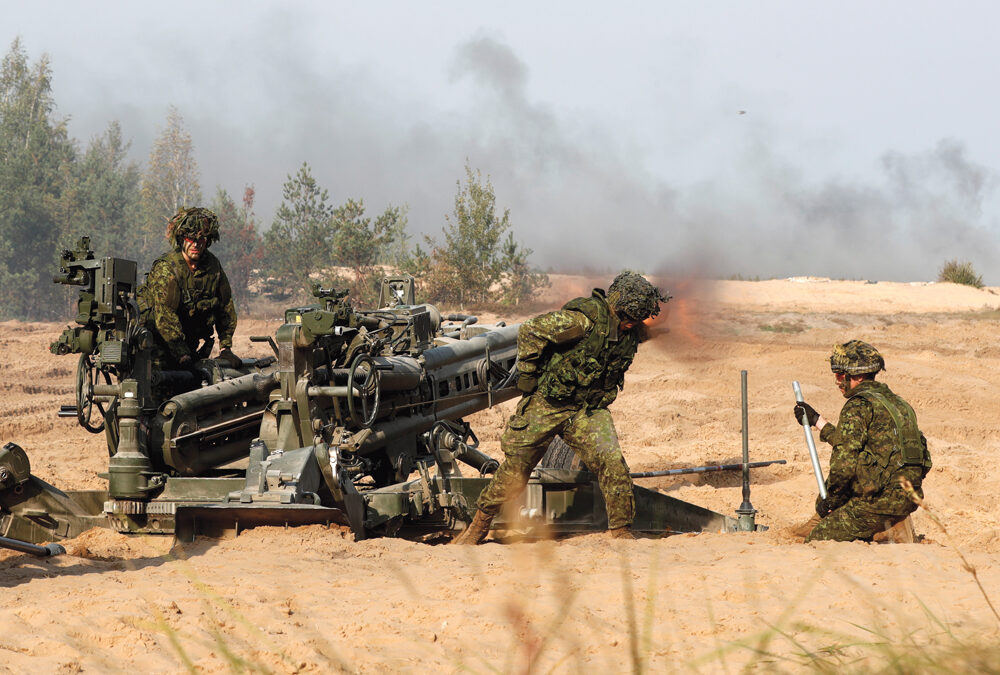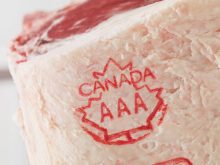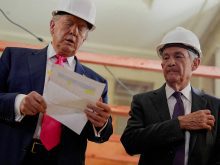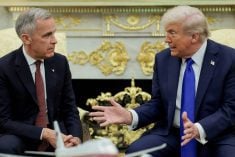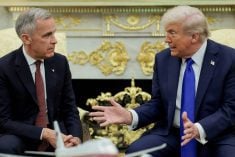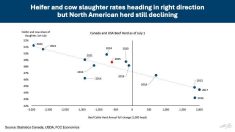The key to boosting Canadian exports to the U.S. could be more Canadian military spending, says David MacNaughton, Canada’s ambassador to the U.S. from 2016 to 2019.

“We have to become a better partner on security and defence if we expect to have some type of partnership and some kind of recognition on trade that we expect out of the Americans,” MacNaughton told the Canadian Crops (Virtual) Convention March 3 during a question-and-answer session with Canola Council of Canada president Jim Everson and Canada Grains Council president Tyler Bjornson.
“I think we can’t be tone deaf to that. And I think if you’re going to have a real partnership, and if you’re going to be listened to, and you’re going to get some of the things that you want you have to be sensitive to what the other person wants. And I think we have not done as good a job as we should have on security and defence. I don’t think we have stepped up to the degree that we should. As much as our armed forces have made tremendous contributions and sacrifices in places like Afghanistan and the Middle East and elsewhere we are not doing as much as we should. And I think if we don’t it’ll come back to haunt us.”
Read Also
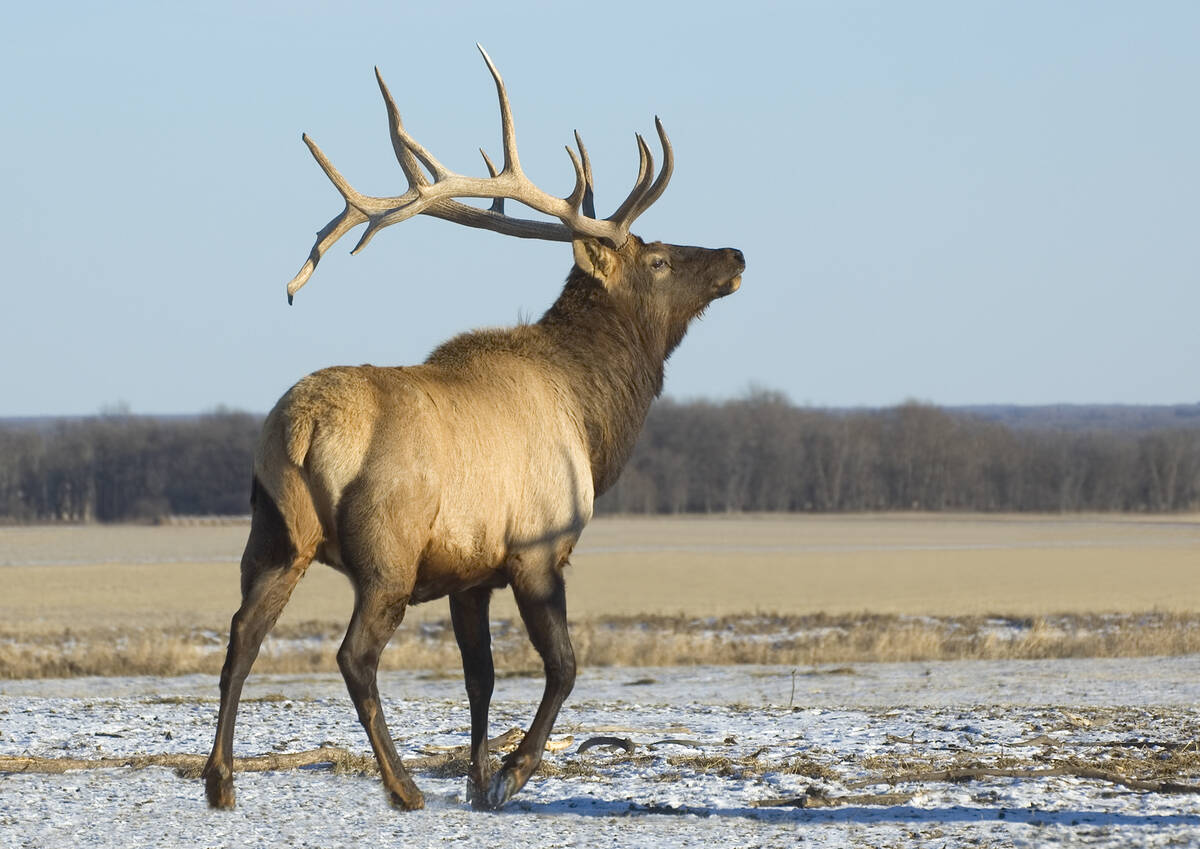
Manitoba Beef Producers take aim at elk surge, feed losses from wildlife
Resolutions at last month’s Manitoba Beef Producers meeting seek help to rein in elk and deer populations, expand fencing supports and improve compensation for wildlife damage.
The United States is Canada’s biggest trading partner by far, including in agriculture. And even though President Joe Biden is expected to restore predictability after defeating the erratic Donald Trump it’s unclear if Biden will be any less protectionist.
While President Biden’s tone is different from his predecessor’s, protectionism is in the Democratic Party’s DNA, MacNaughton said. It’s an open question as to whether the new administration will be any less protectionist, he said.
“The words sound good but I am waiting to see the evidence and that will take time,” MacNaughton said.
“The notion… that the United States doesn’t need our oil, or natural gas, or our electricity is just absurd. U.S. production of oil has fallen by two million barrels a day. They still depend on our oil for their gulf refineries. Our emissions are lower than they are from California. There’s a lot of ignorance about the contribution Canada can make to their economy. I think we need to highlight that more and educate them more on how we can make them more secure and more resilient because that’s the only way we’re going to fend off that kind of protectionism.”
Meanwhile, the U.S. and Canada have some common interests, including mitigating climate change. MacNaughton agreed both nations have a common interest in biofuels.
“I would put that at the top of the list how you can fit in this whole new agenda (on climate change), which I think they take seriously, and I don’t see any future government going back to where Trump was,” he said.
The good news is Canada successfully renegotiated the North American Free Trade Agreement (NAFTA) with the former U.S. administration retaining important measures including dispute settlement mechanisms, MacNaughton said.
Canadian agriculture faces two important issues. One is how Canada fits in the relationship between the U.S. and China; the other the U.S. role in helping restore international institutions, including the World Trade Organization (WTO), which Canada, has relied on to enforce trade rules.
Trump left the WTO to wither, by failing to appoint American representatives to its Appellate Body.
Even though President Biden has declared the U.S. is again willing to participate internationally, MacNaughton said he doesn’t think multilateral institutions such as the WTO, United Nations and NATO will be as effective as they once were.
“And we’re going to have to have sharp elbows and brass knuckles where we’ve got some leverage,” he said. “I don’t think we can sort of rely on the international-based system to protect our interests.
“We’re going to have to toughen up a little bit in how we deal with international organizations.
“Sometimes I think we pride ourselves in being too nice. We should ban (the word) sorry from the Canadian vocabulary.”
While Canada must clearly be aligned with the U.S. on China, Canada must be wary.
“On the key elements in the relationship with China we’re going to have to have their (U.S.) backs and we’re going to have to make sure they have our backs too and they (U.S.) can’t go and cut side deals,” MacNaughton said.
Canada took the U.S. for granted and Trump’s threat to tear up NAFTA jolted Canada out of its complacency, he said.
“We have to continue to engage in the U.S. in terms of making sure that we are seen as their best friend, their strongest ally… and that’s not just on trade but on defence and security,” MacNaughton said.
In the meantime, Canada can help the U.S. restore its reputation internationally. If the U.S. proves to Canada it can be trusted again, Canada can take that message to the rest of the world, he said.
“It’s one thing to say ‘we’re back’ — words are cheap — but actions matter,” MacNaughton said. “So I think we can help the Americans get back into the international community, which is going to be really important because if the rest of the democracies don’t trust the Americans it really does open up the world for the Chinese to become more and more dominant.”
Asked about branding Canadian farm products as “sustainable,” MacNaughton said there’s no question it will help exports.
American farmers have a lot of political power in part due to the system of government with each state having two senators no matter its population.
Most farm states vote Republican, but the Democrats pay attention to farm issues too.
Canadian farmers have done a good job making their case to the Canadian government, but there’s always room for improvement, MacNaughton said.
Farm groups know what they want to tell politicians.
“(But) they hadn’t given sufficient thought as to how that would fit within the government’s agenda,” he said.
“Try to keep that in the back of your mind when you’re talking to politicians and bureaucrats.”


